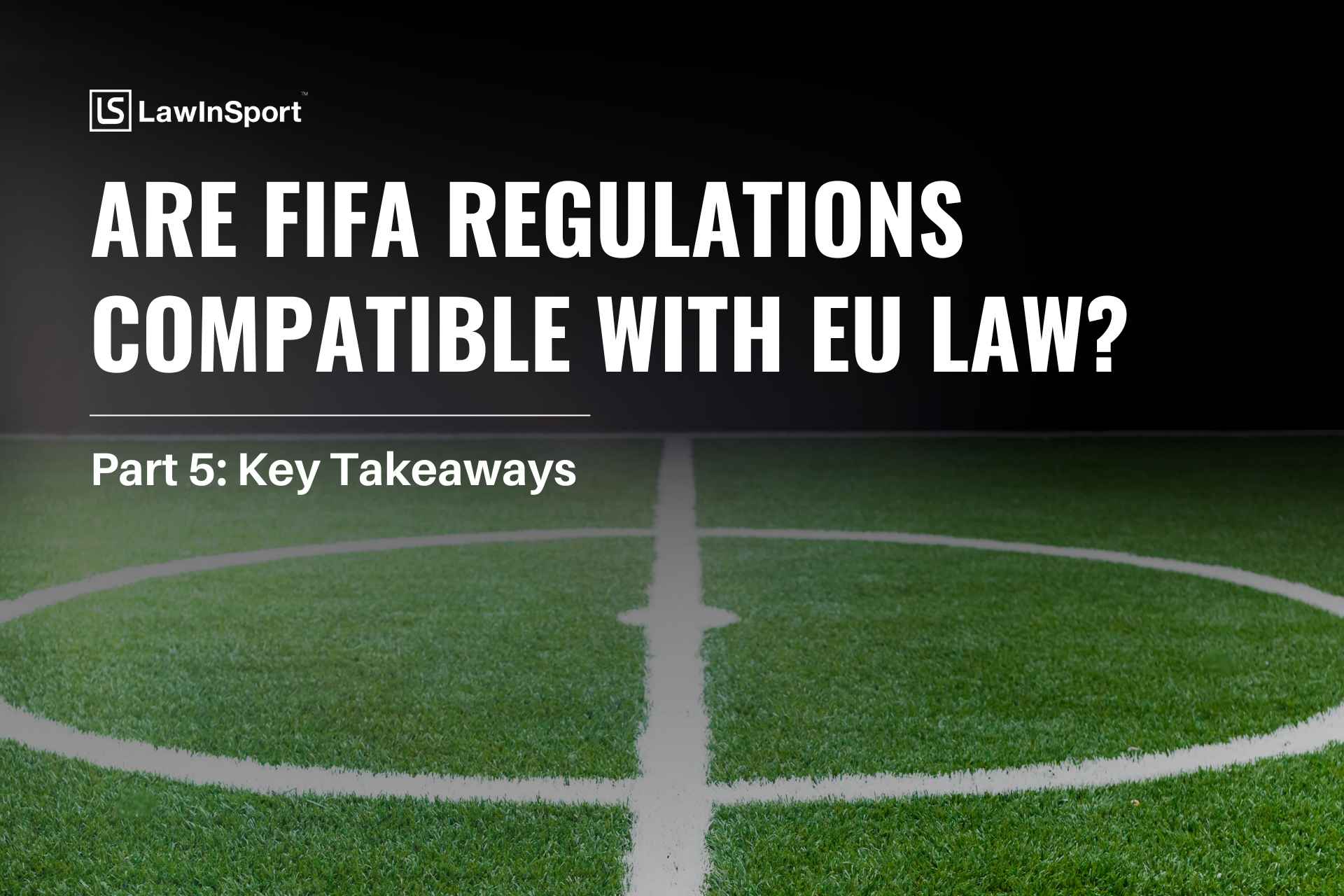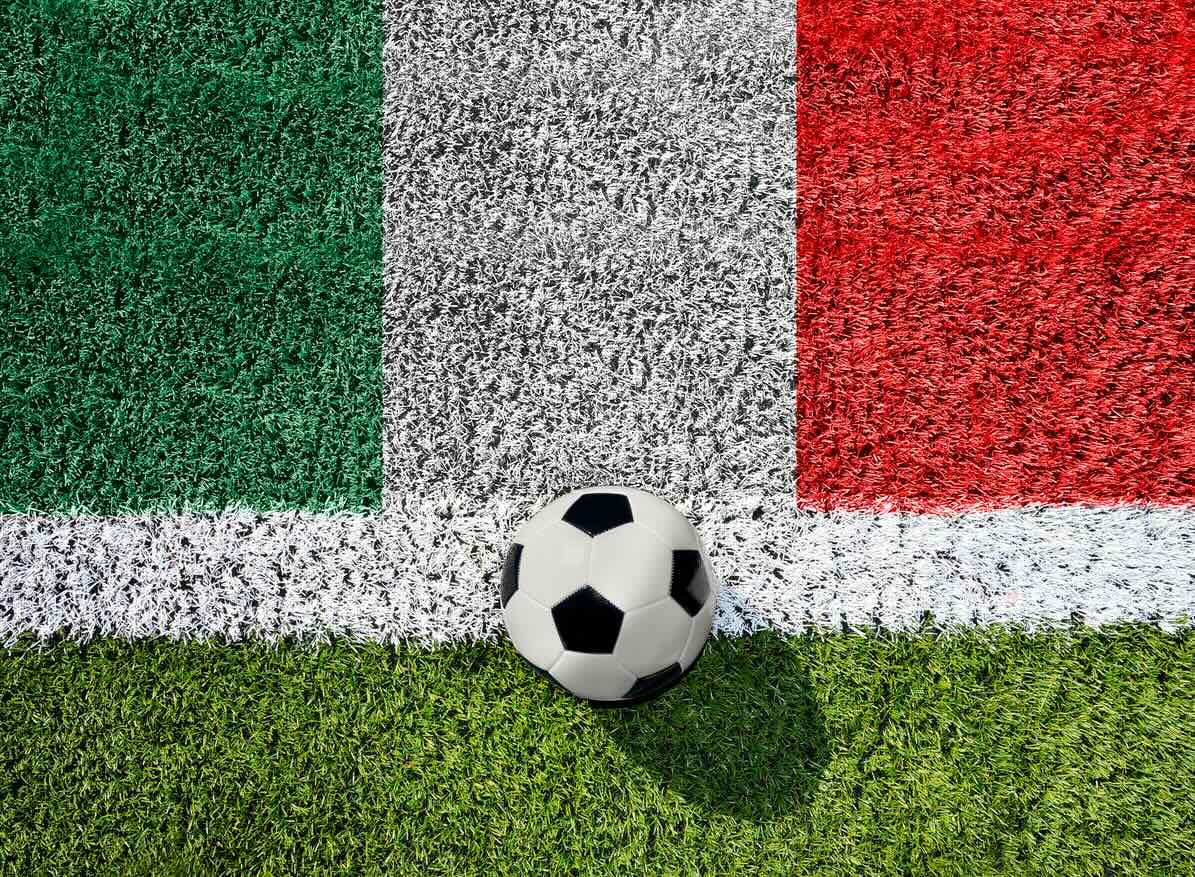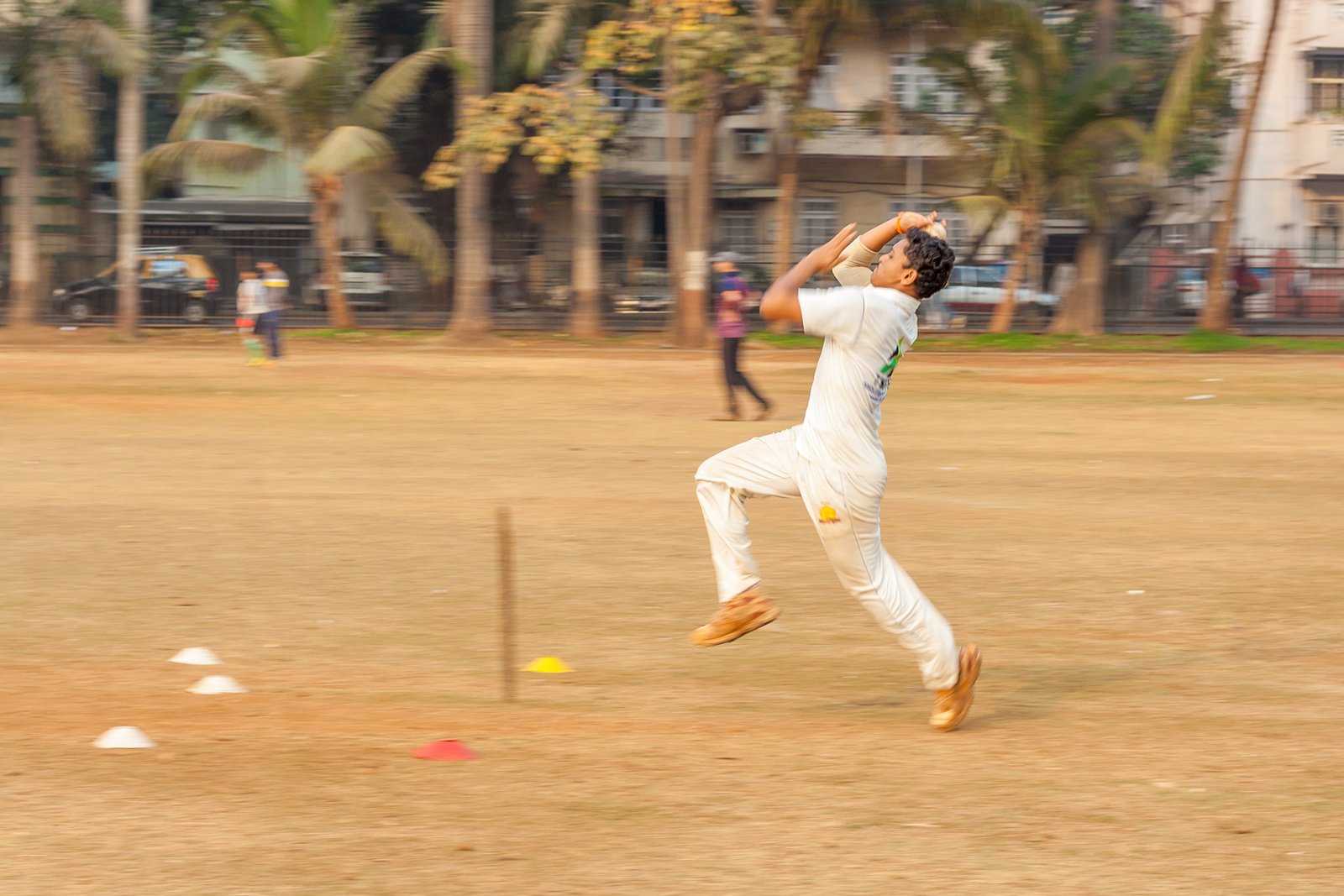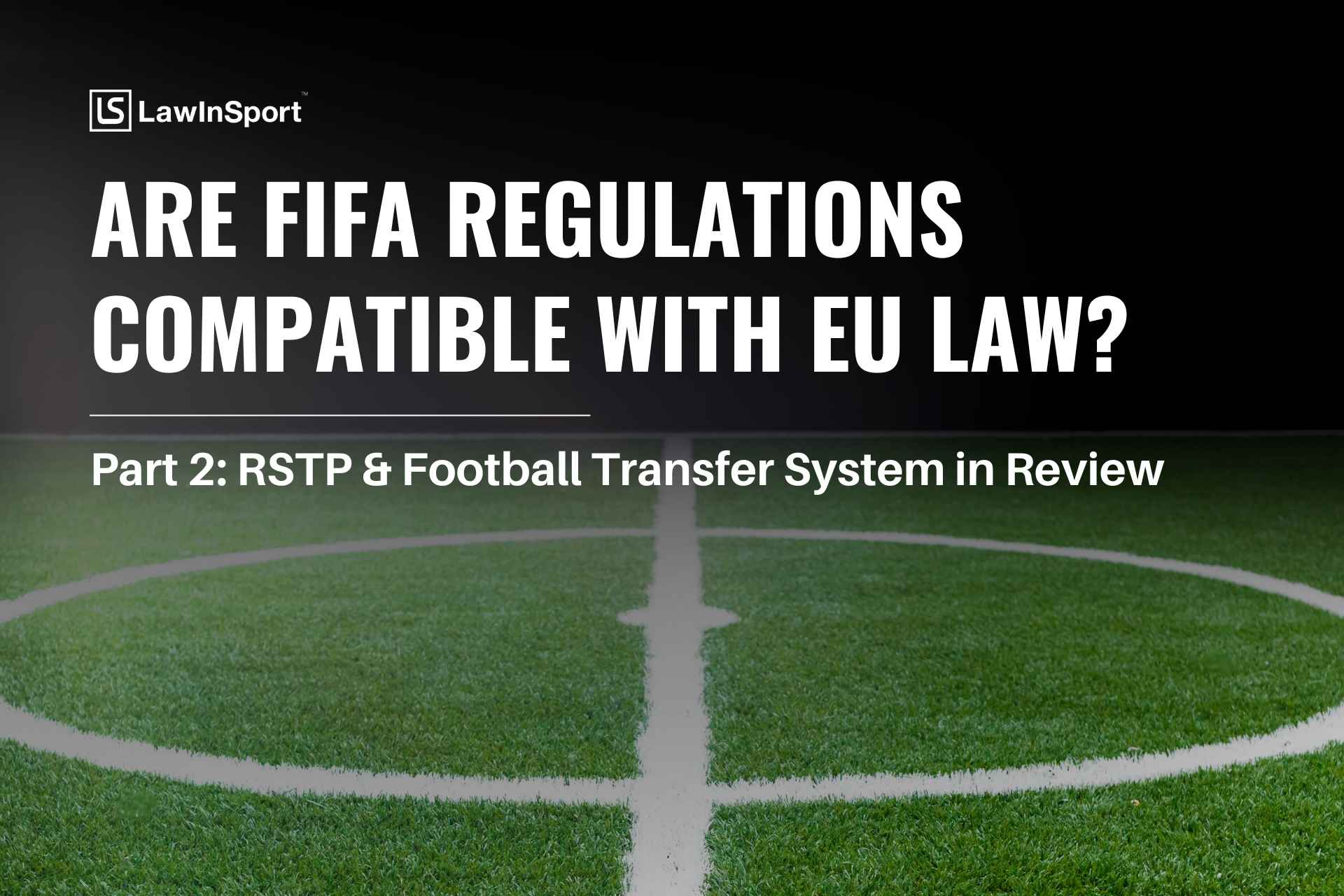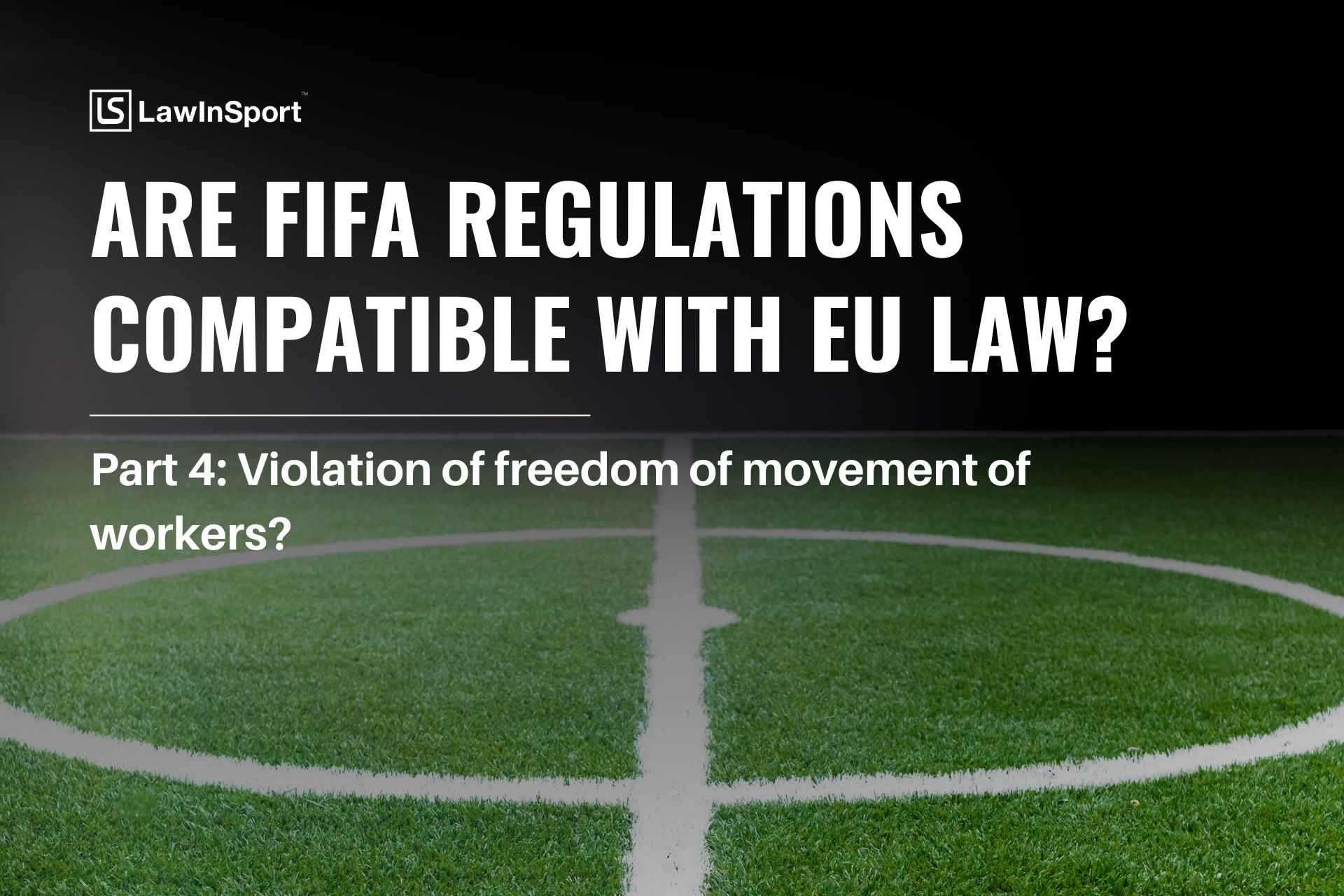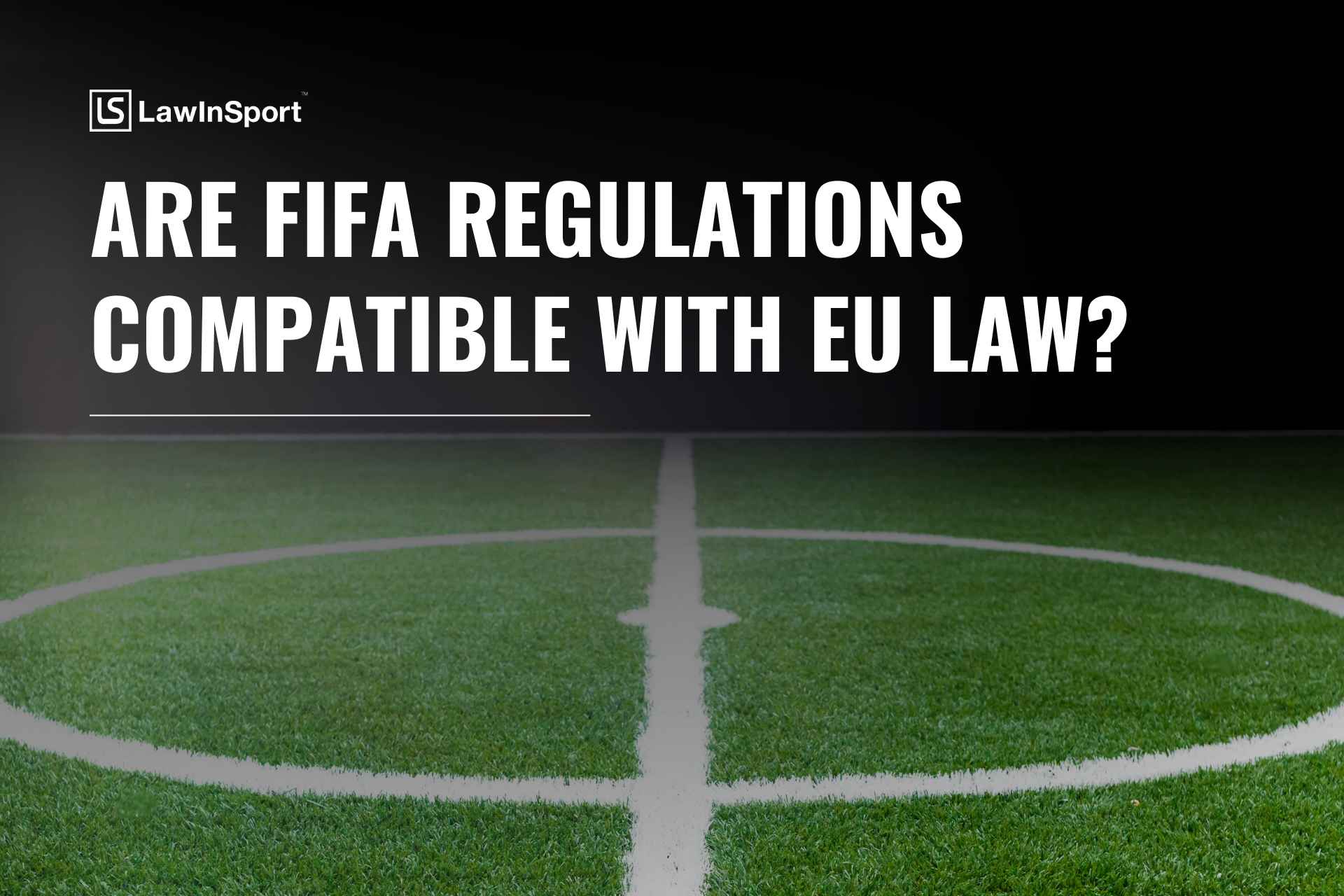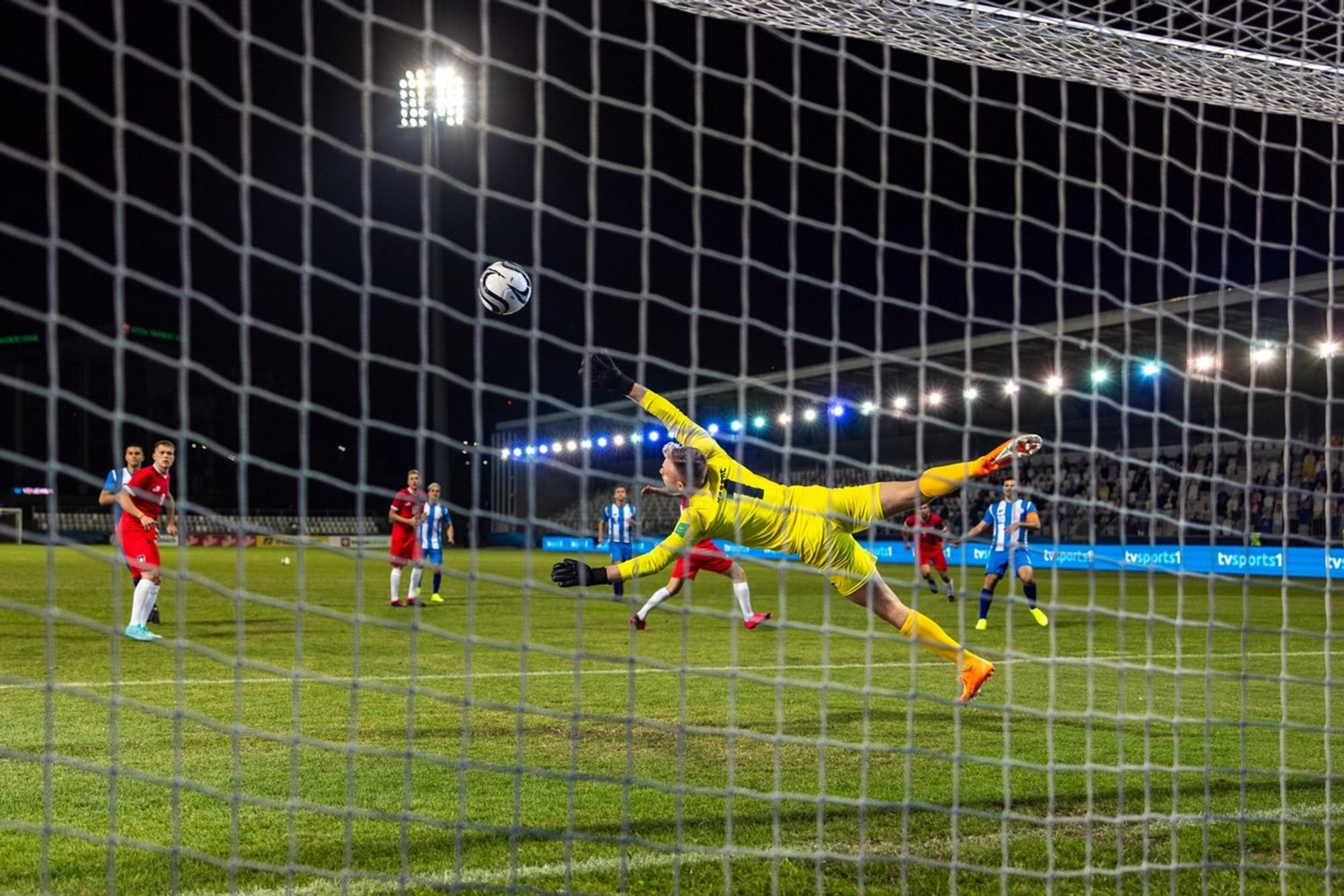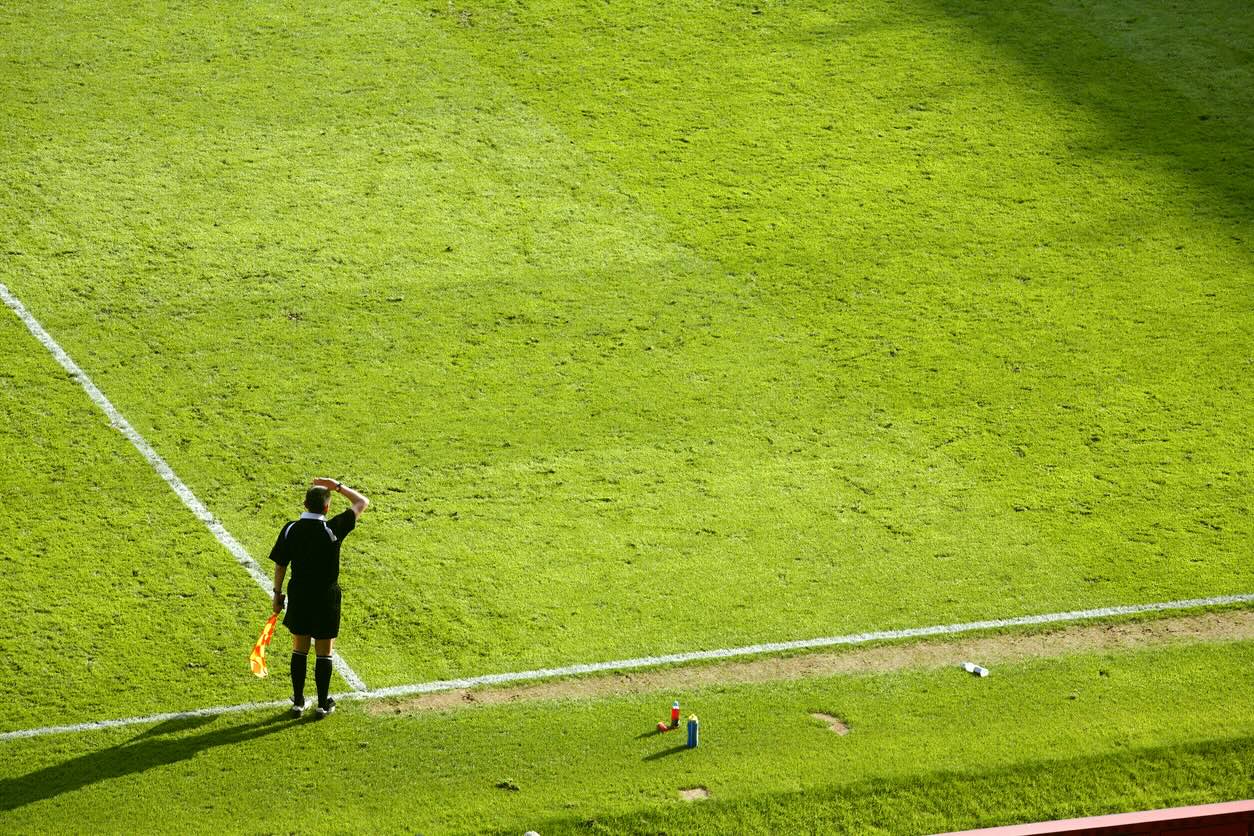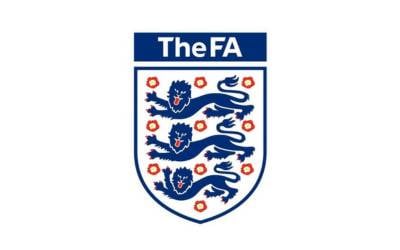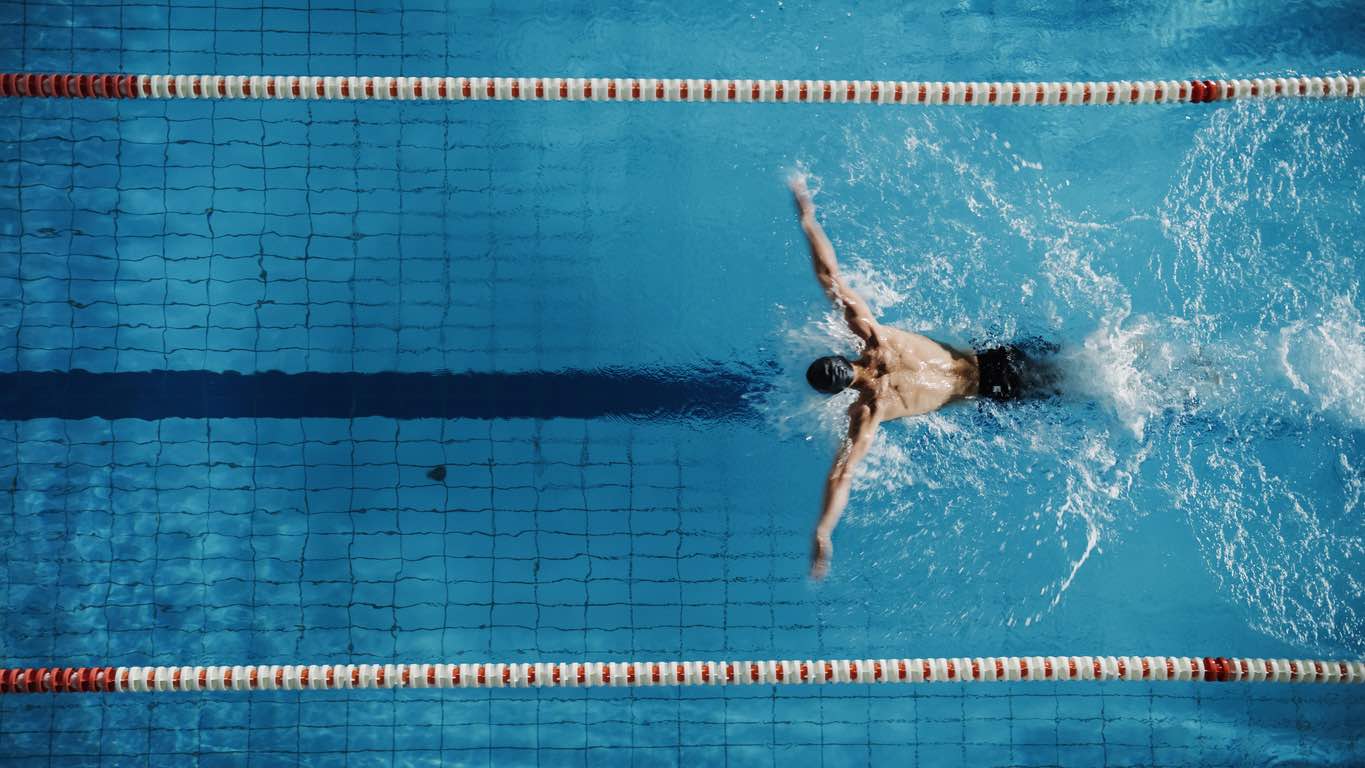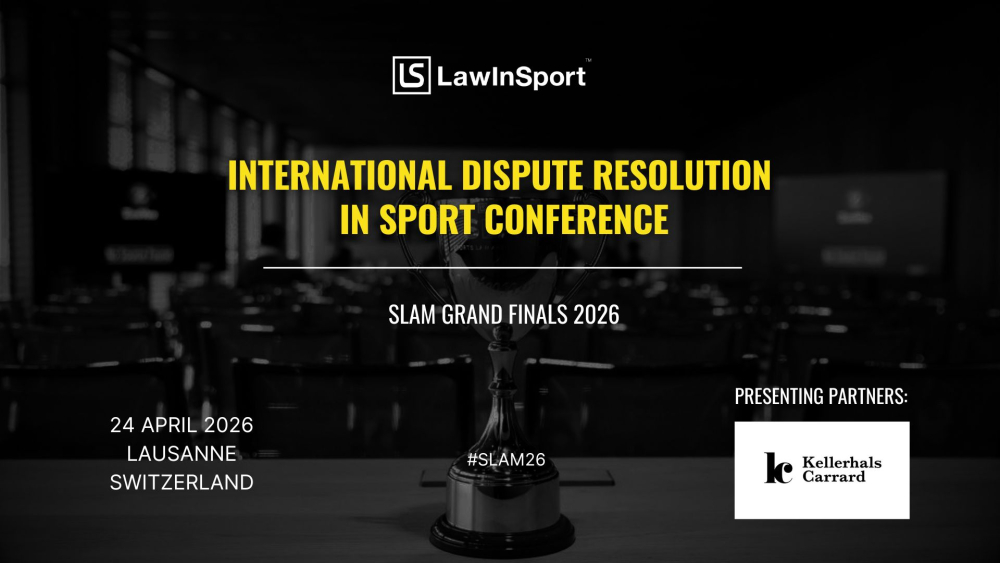COPA América’s stadia controversies: What can FIFA learn for the 2026 World Cup?
Published Friday, 27 September 2024.
Competition Authorisation Rules: UEFA chooses Ireland as alternative seat for CAS arbitration
Published Friday, 20 September 2024.
Advocate General questions whether FIFA Regulations are compliant with EU Law: Legal & factual context (Part 1)
Published Wednesday, 11 September 2024.
Advocate General questions whether FIFA Regulations are compliant with EU Law: Are they restrictive of competition? (Part 3)
Published Wednesday, 11 September 2024.
cAdvocate General questions whether FIFA Regulations are compliant with EU Law: Key takeaways (Part 5)
Published Wednesday, 11 September 2024.
English contract law and football: Lessons from Appeal Board’s decision in the Leicester City case
Published Friday, 06 September 2024.
Navigating dispute resolution for technical directors in football
Published Tuesday, 27 August 2024.
A guide to Brazil’s new regulations for sport betting operators and foreign entrants
Published Thursday, 15 August 2024.
Guidance on PSR Rules from Premier League’s Independent Commission in Leicester City’s case
Published Friday, 09 August 2024.
Tax on transfers to Spanish clubs: Supreme Court ruling in Neymar & James Rodríguez cases
Published Friday, 09 August 2024.
Levelling the playing field: Spectator accessibility in UK sports stadiums & venues
Published Wednesday, 31 July 2024.
What do footballers moving to Italy in 2024 need to know about structuring their taxes (Part 2)
Published Friday, 12 July 2024.
More than just a number: how India is trying to tackle age fraud in sports
Published Friday, 12 July 2024.
The battle over the employment status of professional athletes: Amy Pieters v. SD Worx
Published Friday, 05 July 2024.
Reassessing data protection in anti-doping – key points of Advocate General Ćapeta’s opinion
Published Wednesday, 03 July 2024.
Demystifying Andretti’s failed F1 bid & anti-dilution fees explained
Published Saturday, 29 June 2024.
Navigating the use of image rights for Polish National Football Team Players
Published Wednesday, 19 June 2024.
Circular no. 1889 - Amendments to the FIFA Statutes, the Regulations Governing the Application of the Statutes and the Standing Orders of the Congress
TO THE MEMBER ASSOCIATIONS OF FIFA
Circular no. 1889
Zurich, 7 June 2024
Amendments to the FIFA Statutes, the Regulations Governing the Application of the Statutes and the Standing Orders of the Congress
Dear Sir or Madam,
The 74th FIFA Congress held in Bangkok on 17 May 2024 approved amendments to the FIFA Statutes, the Regulations Governing the Application of the Statutes and the Standing Orders of the Congress as proposed and shared with the member associations per circular no. 1882.
Those amendments align with FIFA’s overall strategic objectives, ensure that FIFA’s overall regulatory framework remains relevant and adapted to the changing circumstances within the global game and generally aim to protect the best of interests of football for the future.
These amendments are set out in the enclosed version of the FIFA Statutes, the Regulations Governing the Application of the Statutes and the Standing Orders of the Congress (May 2024 edition).
Entry into force
The new version of the FIFA Statutes will enter into force on 16 July 2024 (60 days after their approval at the 74th FIFA Congress), and will be available on legal.fifa.com and in the 2024 edition of the FIFA Legal Handbook.
We thank you for taking note of the above and please do not hesitate to contact Héctor Navarro Real, Head of Regulatory Governance and Compliance, at
Yours faithfully,
FÉDÉRATION INTERNATIONALE
DE FOOTBALL ASSOCIATION
An analysis of how multi-club ownership is regulated in France
Published Thursday, 06 June 2024.
FIFPRO member unions approve governance upgrades to enhance global player support
- Unions endorse key FIFPRO governance structure reforms and improvements
- Organisational recommendations made following review by management consultancy Oliver Wyman
- Changes include strengthening executive management, reducing board size and implementing term limits
FIFPRO’s member player unions have today approved by an overwhelming majority governance recommendations to enhance the global representation of professional footballers following a review by management consultancy Oliver Wyman.
The governance upgrades that will be introduced over the coming months will streamline how the global board and management operate, making FIFPRO more agile to support and empower players around the world. Member unions agreed to the changes at an extraordinary general assembly which is taking place at FIFPRO headquarters.
Among the recommendations approved were the strengthening of FIFPRO’s executive management team, a reduction in the size of the 18-person global board, and the introduction of a maximum of three term limits for global board members.
As part of the transition to the new governance structure, the current board has agreed to step down to facilitate the process and will be substituted by an interim board until a 12-person board is elected at a General Assembly in November 2024.
FIFPRO is the exclusive global representative of professional footballers and its 66 affiliated national unions between them represent more than 60,000 players.
Among recent achievements for players, FIFPRO negotiated the right for footballers to receive a guaranteed share of FIFA Women’s World Cup prize money and successfully pushed for the first maternity rules across professional football.
Besides supporting national unions and players in hundreds of employment tribunal cases each year, FIFPRO is leading a series of international initiatives for footballers, such as protecting their personal data rights and, at the pinnacle of the game, easing mounting match congestion.
Top Tips For Football Club Secretaries On Drafting Player Contracts
Published Monday, 03 June 2024.
The Shijiazhuang 23 (Part 2) – Why didn't WADA challenge CHINADA’s decision? And should they have done?
Published Friday, 31 May 2024.
The evolution of a human rights-based approach to participation and gender eligibility in women’s sports
Published Friday, 31 May 2024.
Circular no. 1886 - Compliance with applicable regulations regarding release of players to representative teams
TO THE MEMBER ASSOCIATIONS OF FIFA
Circular no. 1886
Zurich, 31 May 2024
Compliance with applicable regulations regarding release of players to representative teams
Dear Sir or Madam,
FIFA is pleased to note that, with the recent approval of the Women’s International Match Calendar 2026-2029, combined with the prior approval of the Men’s International Match Calendar 2025-2030, there is now a clear and consistent framework for the mutually beneficial coexistence of representative-team and club football globally for the future. This hugely positive development allows all football stakeholders to plan responsibly and with sufficient certainty for the benefit of all involved.
A fundamental component of each International Match Calendar is its binding relationship with the release of players to representative teams, as set out in the FIFA Regulations on the Status and Transfer of Players (the “Regulations”). This legal framework clearly lays out predetermined rules around the timing of the mandatory release of players, where validly called up to representative teams by their respective member associations.
In doing so, this framework recognises the need to balance the rights and obligations of both clubs and representative teams, in order to ensure that the harmonious relationship between representative-team and club football continues.
With this in mind, FIFA notes with concern reports of an increasing trend of member associations engaging in “early call-ups” – in other words, arranging or requiring the arrival of players for representative-team duty before the start of the stipulated period of release as set out in the Regulations and therefore outside the release period, where there is no prior agreement with the releasing club in question.
FIFA would therefore like to strongly remind all member associations preparing for the upcoming international windows that call-ups in advance of the opening of the international window in question should not be undertaken unless otherwise mutually agreed between the member association and club concerned.
FIFA also draws attention to the fact that universal compliance with the Regulations and consistency in their application are critical for the long-term health and coexistence of representative-team and club football globally. In this regard, all involved parties and stakeholders must respect the rules and their obligations, in order for this long-standing and successful system to function as intended.
In recognition that there do exist individual cases with unique circumstances where an early release may be in the interest of all involved, FIFA of course promotes and encourages open dialogue in this regard, such that a clear agreement can be found that is acceptable to all parties. In such cases where an agreement is reached, we would take this opportunity to confirm that the cover provided by the FIFA Club Protection Programme as set out in circular no. 1852 will apply from the moment of release by the club in question, thereby providing insurance for the players in question when on duty with those representative teams in scope.
FIFA would like to thank you for your attention to the above and wishes all member associations the best in their preparations for the upcoming windows, as well as in any tournaments in which they are participating over the coming months.
Yours faithfully,
FÉDÉRATION INTERNATIONALE
DE FOOTBALL ASSOCIATION
Belgium’s anti-money laundering law: How does it impact football clubs?
Published Thursday, 17 October 2024.
FIFA Clearing House two years on: A game-changer or still a work in progress?
Published Tuesday, 24 September 2024.
How Are Football Clubs Governed, Incorporated & Acquired In South Africa?
Published Friday, 13 September 2024.
Advocate General questions whether FIFA Regulations are compliant with EU Law: RSTP & football transfer system in review (Part 2)
Published Wednesday, 11 September 2024.
Advocate General questions whether FIFA Regulations are compliant with EU Law: Violation of freedom of movement of workers? (Part 4)
Published Wednesday, 11 September 2024.
Advocate General questions whether FIFA Regulations are compliant with EU Law
Published Wednesday, 11 September 2024.
Premier League v Leicester City FC appeal: What is the right approach to interpreting sports rules?
Published Thursday, 05 September 2024.
Growth in multi-club ownership: Is it time to strengthen global regulations?
Published Wednesday, 21 August 2024.
Expanding maternity rights in football: Analyzing FIFA's 2024 regulations for female players
Published Wednesday, 14 August 2024.
The challenges of ‘Net run rate’ and protecting the integrity of cricket tournaments
Published Friday, 09 August 2024.
A guide to Formula 1’s financial regulations and costs cap
Published Thursday, 08 August 2024.
‘Golden Mitigation’ in football: Lessons from the Nottingham Forest's Profitability & Sustainability Regulations Appeal decision
Published Monday, 15 July 2024.
Tax changes for elite athletes presently in Italy: What you need to know (Part 1)
Published Friday, 12 July 2024.
What the UEFA EURO 2024 tournament has taught us about ambush marketing for future events
Published Tuesday, 09 July 2024.
No independent judge, no EU review: Anti-doping case dismissed by ECJ
Published Wednesday, 03 July 2024.
Manchester City's legal action & the Premier League’s regulations on Associated Party Transactions
Published Tuesday, 02 July 2024.
Key considerations for athletes for selection disputes
Published Friday, 21 June 2024.
Leicester City's legal challenge: Unpacking the EFL and Premier League allegations
Published Tuesday, 18 June 2024.
Clubs agree at AGM to trial an alternative League-wide financial system next season on a non-binding basis
At the Premier League’s Annual General Meeting today, clubs agreed to trial an alternative League-wide financial system next season (2024/25) on a non-binding basis.
The existing Profitability and Sustainability Rules (PSR) will remain in place, but clubs will trial Squad Cost Rules (SCR) and Top to Bottom Anchoring Rules (TBA) in shadow.
This will enable the League and clubs to fully evaluate the system, including the operation of UEFA’s equivalent new financial regulations, and to complete its consultation with all relevant stakeholders.
The overall system aims to improve and preserve clubs’ financial sustainability and the competitive balance of the Premier League, promote aspiration of clubs, facilitate a workable alignment with other relevant competitions and support clubs’ competitiveness in UEFA club competitions, while providing certainty and clarity for clubs, fans and stakeholders.
SCR will regulate on-pitch spend to a proportion (85 per cent) of a club’s football revenue and net profit/loss on player sales.
TBA is a League-level anchor linked to football costs, based on a multiple of the forecast lowest central distribution for that season. It is designed to be a pre-emptive measure to protect the competitive balance of the Premier League. This protection is intended not to have an impact unless significant revenue divergence of clubs occurs.
Port Vale Fined For Crowd Control Misconduct
Port Vale have been fined £25,000 for misconduct in relation to crowd control at their EFL League One game against Portsmouth on Saturday 27 January 2024.
Port Vale admitted that they failed to ensure their spectators and/or supporters (and anyone purporting to be supporters or followers) conduct themselves in an orderly fashion; don’t behave in an improper, threatening or provocative way; or commit any form of pitch incursion.
An independent Regulatory Commission imposed the club’s fine following a hearing and its written reasons can be read here.
Dual-eligibility challenges in Irish rugby: Does Regulation 9.39 offer a solution?
Published Tuesday, 04 June 2024.
The Shijiazhuang 23 (Part 3) – What comes next? And what are the lessons for future anti-doping investigations?
Published Friday, 31 May 2024.
The Shijiazhuang 23 (Part 1) – The Investigation: New York Times, ARD & USADA vs CHINADA & WADA
Published Friday, 31 May 2024.
Circular no. 1887 - Amendments to the Regulations on the Status and Transfer of Players (RSTP) concerning provisions regarding female players and coaches, the extension of Annexe 7 and the international transfer process for football
TO THE MEMBER ASSOCIATIONS OF FIFA
Circular no. 1887
Zurich, 31 May 2024
Amendments to the Regulations on the Status and Transfer of Players (RSTP) concerning provisions regarding female players and coaches, the extension of Annexe 7 and the international transfer process for football
Dear Sir or Madam,
We are pleased to inform you of several amendments to the Regulations on the Status and Transfer of Players (RSTP), which were approved by the FIFA Council at its meeting on 15 May 2024. The following paragraphs briefly set out the amendments concerning:
(a) provisions regarding female players and coaches;
(b) the extension of Annexe 7 to the RSTP to continue addressing the exceptional situation deriving from the war in Ukraine; and
(c) the international transfer process for football – Annexe 3 to the RSTP.
(a) Provisions regarding female players and coaches
Based on the FIFA Council’s mandate of 14 March 2023 to explore possible further regulatory steps to protect the well-being of female players, the FIFA administration undertook a detailed assessment of the current labour conditions regarding pregnancy and maternity for female professional players with the aim of exploring objective additional regulatory measures.
The amendments and additions to the RSTP in respect of provisions regarding female players and coaches relate to the implementation of the mandated areas and are aimed at ensuring clarity within the current regulatory framework. Furthermore, an equal protection regarding pregnancy and maternity (where appropriate) has been expanded to female coaches. A further objective is the appropriate implementation of these provisions at national level.
In particular, the amendments concern the definitions of the terms “maternity leave”, “adoption leave”, “family leave”, as well as article 1 paragraph 3 a); article 6 paragraph 3 c) and d); article 18 paragraph 7; article 18quater paragraphs 1, 2, 3, 4, 5 and 6; article 18quinquies (new); article 1bis paragraph 11 of Annexe 1 (new); article 1 paragraph 5 of Annexe 2, article 1 paragraph 5 of Annexe 6. These latest amendments focus on:
- • reflecting the reality of female football and promoting inclusivity by extending the rights and protection to adoptive parents as well as non-biological mothers;
- • recognising the physical, psychological and social dimensions in the event of an inability to provide employment services due to severe menstruation or medical complications relating to pregnancy by providing for related rights; and
- encouraging associations to facilitate attachment and emotional balance for female players with their families while on international duty with their national teams.
(b) Extension of Annexe 7 to the RSTP to continue addressing the exceptional situation deriving from the war in Ukraine
As a consequence of the war in Ukraine, on 7 and 16 March 2022, the Bureau of the Council decided to temporarily amend the RSTP to provide urgent legal certainty and clarity on a number of important regulatory matters.
The decisions of the Bureau of the Council, communicated via circular nos. 1787 and 1788, set out the regulatory principles in the form of a temporary annexe to the RSTP (Annexe 7) entitled: Temporary rules addressing the exceptional situation deriving from the war in Ukraine.
Subsequently, on 20 June 2022, the Bureau of the Council decided to extend the temporary amendments to Annexe 7 to the RSTP until 30 June 2023, with minor modifications. The decision was communicated via circular no. 1800, dated 22 June 2022.
On 21 May 2023, the Bureau of the Council approved further temporary amendments to extend and adapt Annexe 7 to the RSTP until 30 June 2024 with the objective being to continue assisting players, coaches and clubs impacted by the war in Ukraine, while at the same time aiming to strike a reasonable balance between all interests at stake and avoiding abuse. These amendments have been communicated via circular no. 1849.
The ongoing situation with the war in Ukraine has resulted in the need to further clarify the application of Annexe 7 to the RSTP, in particular its application beyond 30 June 2024.
The related amendments to Annexe 7 to the RSTP concern the following provisions: article 1 paragraph 2 a) and b); article 2 paragraphs 1 and 2; article 7 paragraph 1. These latest amendments focus on:
- a further temporary extension of the right of foreign players and coaches who have left the territory of Ukraine and Russia due to the conflict, and who might not wish to currently return in view of the situation, to unilaterally suspend their contracts with clubs affiliated to the Ukrainian Association of Football and the Football Union of Russia until 30 June 2025;
- maintaining the limitations on the scope of application of Annexe 7 to the RSTP that were introduced in May 2023 in order to prevent abuses and to ensure that players and coaches exercise their right to suspend their employment contracts in a clear and timely manner; and
- partially reintroducing the obligation to pay training compensation.
(c) The international transfer process for football – Annexe 3 to the RSTP
Annexe 3 to the RSTP establishes the general principles governing the use of the FIFA Transfer Matching System (TMS), the process for international transfers of players in the system and the enforcement of the relevant rules. It also sets the obligations of member associations, clubs and their users when using the system.
In this context, a minor technical amendment to the RSTP has been approved by the FIFA Council in order to reflect the obligation of clubs to also declare in TMS any amendments to previously agreed club-to-club payment terms in the context of an international transfer.
The amendment related to Annexe 3 to the RSTP concerns the following provision: article 12 paragraph 1 of Annexe 3.
Entry into force of the amendments to the RSTP
All the aforementioned amendments will come into force on 1 June 2024, with the exception of the amendment regarding Annexe 3 to the RSTP, which will come into force on 1 July 2024.
The revised edition of the RSTP, as well as explanatory notes concerning the new provisions regarding female players and coaches and an updated explanatory note on Annexe 7 to the RSTP are available on legal.fifa.com.
Please do not hesitate to contact Jan Kleiner, Director of Football Regulatory at
We thank you for taking note of the above and for informing your affiliated clubs accordingly.
Yours faithfully,
FÉDÉRATION INTERNATIONALE
DE FOOTBALL ASSOCIATION
“A big statement”: FIFA introduces measures to further protect female players and coaches
-
Female players and coaches to be provided with additional protections to their well-being
-
Jill Ellis said that women should not have to juggle their career and children
-
Protections unanimously endorsed by FIFA Council
Jill Ellis is speaking from personal experience when she talks about protecting the well-being of female players and coaches. The two-time FIFA Women’s World Cup™ winner remembers trying to coach a college team after adopting her three-month-old daughter, and the difficulties of trying to juggle the two roles.
“(A football career) shouldn’t be exclusive of being a mum or raising a child, it should be inclusive of that,” she said. “If I didn’t have support around me, I wouldn’t have had the ability to do that and maintain my career.”
FIFA, however, has been listening to the concerns of women in the game and, following thorough discussions with key stakeholders and a previous set of landmark reforms, has moved to further protect their well-being by implementing changes to the Regulations on the Status and Transfer of Players (RSTP) that will enter into force on 1 June 2024.
Approved by the FIFA Council in May 2024, these changes will extend the rights and protections to adoptive parents as well as non-biological mothers. They will also recognise the physical, psychological and social dimensions in the event of an inability to provide employment services due to severe menstruation, or medical complications relating to pregnancy, and member associations will be encouraged to allow female players to have contact with their families while on international duty.
“FIFA is committed to implementing a dynamic regulatory framework that is sound and suitable for the increasing needs of female players and coaches,” said FIFA Chief Legal & Compliance Officer Emilio García Silvero. “In order for the game to further flourish, it’s absolutely key that we have a holistic approach towards player well-being, including the legal aspects.”
“As a modern organisation, it’s FIFA’s duty to listen to the main actors and adapt its regulations to the ever more complex dynamics of professional football. We would like to thank all the stakeholders that have contributed to the drafting of these robust regulations, and look forward to seeing them being implemented and positively affecting the lives and careers of women in football.”
“I think it’s a big statement,” said Ellis, who led FIFA’s Technical Study Group at the FIFA Women’s World Cup 2023™ and coached the USA to Women’s World Cup titles in 2015 and 2019. “These are big steps and big strides to really normalise the life that we go through as women … that’s what we want to provide now at every level, the club level, the national team level – the opportunity for pro players to have the chance to be mums.”
The steps deliver on important points in Goal 2 of FIFA’s Strategic Objectives for the Global Game: 2023-2027, which describe the organisation’s commitment to exploring and implementing further safeguards for player and coach welfare.
Like Ellis, former Germany international Fatmire Alushi – a FIFA Women’s World Cup winner in 2007 – has first-hand experience of raising children while pursuing a football career. “I appreciate very much FIFA getting involved to protect pregnant women so that they can have a good feeling, enjoy their pregnancy, and can get support during and after the pregnancy,” said the mother of four.
FIFA Chief Football Women’s Officer Dame Sarai Bareman said the new measures recognised that the players are the main stakeholders. “They are the ones who are on the field, who are playing the sport, they’re training hard every day, really sacrificing a lot to entertain the fans and to deliver the beautiful matches that we see,” she said.
The measures also recognise that women have different biological make-ups, she said. “When you’re playing sport for a living, and in a professional environment, we have to factor in that the female menstrual cycle can also impact on your ability to deliver within your role. So, it’s important that we protect … those that are affected by their menstrual cycles in a way that it doesn’t put at risk their employment situation with their club and, ultimately, their ability to earn money.”
Bareman welcomed the move to encourage more family contact for national team players. “In a FIFA Women’s World Cup, (a player) can potentially be away from her family for five or six weeks … and that can have a big toll on the player, mentally, but also on the child.
“So, encouraging the member associations to make provision or to allow for those mothers and parents to have the children with them during the camp, during the tournament, is a really important step which will support not only female players but all players in our sport.”
Regulations on the Status and Transfer of Players - June 2024 edition
Explanatory Note on Annexe 7 to the Regulations on the Status and Transfer of Players





